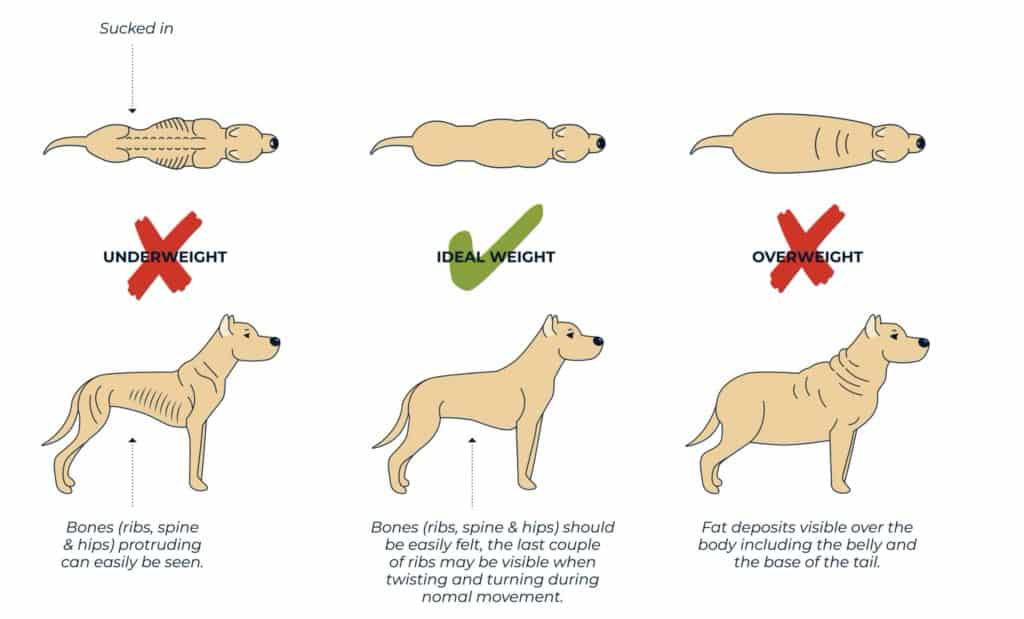Hi. My name is Kyle and I share my life with a French Bulldog named Augie. Augie loves to eat and like most French Bulldogs he is very food driven. I mean – he LOVES to eat. As these French Bulldog memes illustrate, loving food is pretty common for French Bulldogs. They are connoisseurs who really like their food!
But this presents some challenges for you, the French Bulldog parent. Because you are the one who is going to have to put your Frenchie on a diet if he gets too plump. You are the one who is going to have to measure out the portions and count the calories. You are the one who is going to have to man up in the face of that pleading, mournful stare.
Trust me, I’ve been there. You don’t want this to happen to you. This is why I wrote this French Bulldog weight guide.
Identify The Ideal French Bulldog Weight For Your Four-Legged Companion
You see, at first I didn’t realize Augie was getting fat. But then I ran into a friend who also has a French Bulldog. And she took one look at Augie and exclaimed, “He looks just like an eggplant!” (This is not a compliment).
I didn’t yet know that, just like people, French Bulldogs can also have an ideal body weight.
Frenchies are pretty little, actually! They are a breed that thinks they are big and certainly eats like it too. But in reality, these incredibly popular pint-size pups typically top out at less than 30 pounds fully grown.
So let’s take a look at how to identify your Frenchie’s ideal body weight.
Establish your Frenchie’s ideal body weight
As Vet Care Animal Hospital points out, French Bulldogs are prone to obesity. Added pounds on your Frenchie’s frame can shorten their lifespan by causing some health complications.But just because your pup is prone to gaining weight doesn’t mean she will. Knowing where your Frenchie should be helps and then taking care to feed them properly and exercise them regularly.
Know the average statistics for French Bulldog Weight
According to the American Kennel Club (AKC), the French Bulldog typically stands between 11 and 13 inches tall from paw pad to shoulder.The breed typically weighs less than 28 pounds in adulthood. There can also be adult weight differences based on gender. As the Kennel Club (KC) points out, the French Bulldog breed standard has an average weight of 24 pounds for adult females and 28 pounds for adult males.
- Typical French Bulldog Weight: 16-30 pounds
- Male French Bulldogs typically weigh 20-30 pounds
- Female French Bulldogs typically weigh 16-24 pounds
- Typical French Bulldog Height: 11 inches to 1 foot tall at the shoulder level
Work with your canine veterinarian to establish a personal BMI for your Frenchie
Your own French Bulldog may weigh more or less and be taller or shorter than the breed average. Just like with people, Frenchies inherit their body structure and genes from their parents.This means you can’t just use a breed average as your go-by for deciding what your French Bulldog should weigh. Your French Bulldog weight goals will depend on your dog’s parents, how and where she carries her weight, her daily activity level, what French Bulldog food you choose to feed and other factors.
When in doubt, always consult your dog’s veterinarian before making any alterations in your dog’s daily diet.
Is Your French Bulldog Overweight? Multiple Simple Methods to Tell
If you do these and you suspect your dog is overweight, the next step is always to talk with your dog’s veterinarian to get guidance on safe ways to lose weight.
Do the spine/rib test
The rib test is easy to learn. Your veterinarian can show you how to do this test if you feel unsure.Here is what to do. First, run your hands gently down your dog’s back. Can you feel each vertebrae ridge? Deep ridges may mean your dog is actually underweight. No ridges is a good indication your Frenchie may be overweight.
Next, run your hands down your dog’s chest and across her ribcage. Can you feel each rib? If you feel them easily, your dog may actually be underweight. If you struggle to detect each individual ridge by touch, chances are good your Frenchie is overweight.
Do the visual test
This test is even easier than the spine/rib test. All you have to do is give your dog a good visual once-over.
Source: https://www.bellaandduke.com
When you look at your Frenchie, do you see ribs sticking out visibly? This is a sign your dog may be underweight. If you don’t see any ribs (but you also don’t see any rolls) your dog may be at a healthy weight.If you look at your dog and see fat rolls, or if you can’t see any hint of muscle definition as he moves around, this is another visual sign he might be packing a few extra pounds.
Do the play test
The final test is the most fun in my opinion. But you also want to proceed with caution because you don’t want to overtire your Frenchie and cause breathing issues.Grab your dog’s favorite toy and have a round of go fetch or tug-of-war – whatever game your dog likes the most.
Is your Frenchie excited to play? Or does she conk out after just a few minutes? Is she breathing harder than usual? This could be a sign that your dog has gotten too heavy.
An alternate (or adjunct) to the play test is the self-grooming test. Just watch your dog as she grooms herself. Does she have trouble reaching her tail area or back paws? On such a petite pup, extra fat on the midsection or legs can make it really hard to maneuver to self-groom properly.
Why Do French Bulldogs Become Overweight?
I have kept and cared for French Bulldogs for many, many years. I know this breed can have certain genetic health issues that may cause an increased appetite.No matter how much my Augie loves his food and treats, I always tuck this fact away in the back of my mind. When I see him tear into his dinner with gusto, I also stay alert for signs that his enthusiastic eating may be caused by an underlying health issue.
What are some health issues that could cause Augie to crave more food or, alternately, start packing on the pounds even if his daily caloric intake doesn’t increase?
Autoimmune thyroiditis
The main genetic health concern for French Bulldogs is autoimmune thyroiditis.According to the Orthopedic Foundation for Animals’s Canine Health Information Center (CHIC), French Bulldogs should ideally be screened for this condition prior to breeding.
Thyroid conditions can cause increased appetite. Thyroid problems can also cause sluggish metabolism and weight gain.
Brachycephalic airway syndrome
Brachycephalic airway syndrome is the medical name for a health condition that can arise for dogs with flattened faces.French Bulldogs are really cute, but sometimes their wide grins and smushed-in noses hide a secret health issue. Dogs with shortened muzzles can have shortened airways and trouble breathing. These dogs can also have tooth overcrowding that makes it hard for them to grasp and chew their food.
Sometimes a French Bulldog may actually act ravenous because he is having trouble grasping, chewing and swallowing his dinner! In this case, your dog may be emotionally and behaviorally programmed to overeat when the eating is good (or easy) just to make sure he gets enough food.
Diabetes

As the French Bulldog Club of America points out, both diabetes and thyroid issues tend to crop up later in life as your dog enters the golden years. This is a time when weight gain is common as Frenchies become more sedentary and their metabolism slows down accordingly.
How to Help Your French Bulldog Lose Weight
When you suspect your French Bulldog is carrying a few extra pounds, the first step is always to have your dog’s veterinarian confirm this.Next, you can work together to determine your dog’s goal weight and corresponding caloric decreases in food and treats to help you get there.
However, if you are a fan of “pet reality television,” you are probably already aware that owners of overweight dogs are usually advised to put their pups on an exercise regimen as well.
This helps to ensure that overweight dogs gain muscle tone even as they lose fat. More importantly, adding more exercise to your dog’s day provides extra enrichment, excitement and healthy habits that can prevent another round of weight gain in the future.
Of course, with the French Bulldog’s shortened airways, it is important to approach adding in exercise with caution. You don’t want to overtax your dog and cause collapse.
My Augie loves to play. But I have to watch him carefully. If I see him start to breathe heavily or struggle to catch his breathe, I stop our play session immediately.
Because of this, cutting back on your dog’s daily calories will definitely be a vital part of helping your pup lose weight. You should also aim for shorter play sessions more frequently throughout the day to help your dog burn calories safely.
A Healthy Frenchie Is a Happy Frenchie – Help Control French Bulldog Weight
Your French Bulldog can’t tell you in “people words” that he is not feeling good. But you can often tell by behavior and by knowing what to look for.If your Frenchie is less enthusiastic about play, seems to be having trouble breathing or has trouble doing regular self-grooming, clearly there is something amiss.
Whether it is a French Bulldog weight problem or another health issue will be up to your dog’s veterinarian to diagnose. It is always a good idea to seek the guidance of a trained professional.
Once you understand why French Bulldogs are prone to weight gain, you can safeguard against it and keep your pup healthy.



